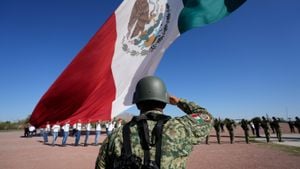The South Korean National Assembly is amid heated investigations concerning Defense Minister Lee Jong-sup, as new testimonies cast shadows over military operations and leadership accountability. On the 21st, Rep. Park Sun-won, of the Democratic Party, revealed significant insights during hearings aimed at unraveling complex operations involving former military officials.
Park's statements during the special committee's inquiry indicated alarming coordinates within the military command structure, particularly concerning the 'HID Agent Bomb Vest Murder' operations and the roles played by influential figures including Kim Yong-hyun, the former Chief of the Joint Chiefs of Staff. "The command line for the ‘HID Agent Bomb Vest Murder’ operation was Kim Yong-hyun," Park stated firmly, implying direct involvement of top military leadership and highlighting anomalies in military oversight.
General Park, who was called as a witness, confirmed during the hearings the highly irregular nature of the command setup, emphasizing, “the normal command line should follow from the Intelligence Commander to the Chief of the Joint Chiefs of Staff to the Minister of National Defense. It was unusual for orders to flow from the Chief of Operations Headquarters directly.” This statement not only raises questions about military protocols but also brings Kim Yong-hyun under scrutiny for his directive roles.
Rep. Park continued: "Through today’s testimony, we can see Kim Yong-hyun and Noh Sang-won had already planned to kill friendly forces returning from missions and destroy evidence since 2016." This assertion paints the actions of senior officials as not only legally questionable but also morally reprehensible, and reinforces the urgency of the investigation.
The discussions surrounding this investigation are compounded by Noh Sang-won's controversial notebook. Park mentioned its contents are unthinkable, containing directives for dealing with so-called “Class A collection targets” through means such as "gas, detonation, sinking..." Park stressed, "the contents are extremely vicious and reflect orders for carrying out missions against returning forces. Each detail strengthens the argument for accountability within the ranks of those at the highest decision-making levels.”
The political ramifications of these findings extend beyond mere allegations; they feed directly back to wider discussions. With South Korean politics deeply polarized, calls for accountability encompass the looming threat of impeachment against President Yoon Seok-yeol if the evidence suggests widespread complicity or wrongdoing among top officials. Legal analysts and political experts foresee upcoming weeks as pivotal for both public trust and political stability.
The National Assembly's investigation reflects not only on individual accountability but fundamentally questions the processes of governance and military transparency. Park's inquiry aims to align the actions of these leaders with their public responsibilities, which many citizens contend have been undermined over time.
Political analysts are closely monitoring how the findings will influence forthcoming political maneuvers, particularly with predictions of potential cabinet reshuffles following these revelations. Speculations abound about who might step up to serve if sweeping changes are made, considering the capabilities of current assembly members and their standings.
Grassroots response to the investigation has been layered with skepticism concerning the integrity of both military leadership and government bodies. The urgency and gravity of the testimonies beg the question: will these initiatives restore the faith of the Korean people, or will they merely spiral downward, feeding cycles of mistrust? The continued expositions during assembly hearings will undoubtedly remain center stage as officials navigate these tumultuous waters.
What emerges from this investigation may likely redefine aspects of South Korean political culture, potentially reinforcing calls for reform and greater accountability across the board. Whether these measures take root will depend heavily on the integrity exhibited by both political leaders and military heads as they engage with public scrutiny post-investigation.
Finally, experts stress the need for procedural reforms to prevent such incidents from resurfacing and to establish clearer lines of accountability moving forward. The National Assembly’s current efforts could very well signal the turning of tides within the governance frameworks of South Korea, ushering a new era of transparency and responsibility.



